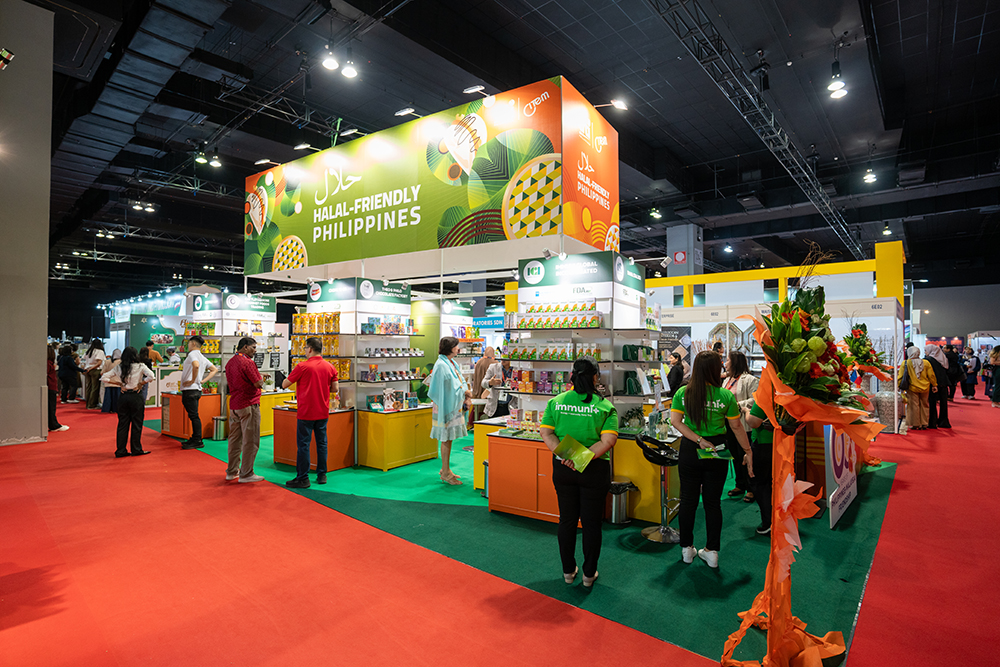
Malaysia International Halal Showcase 2024
Asia’s Rising Star in the Global Halal Market
With a bold mix of innovation, strategic alliances, and a growing reputation for quality food products, the Philippines positions itself as a strong key player in the booming USD 3.96 trillion Halal economy.
July 14, 2025
Once considered a niche market, the Halal food and beverage industry, amounting to trillions of dollars, is now a perfect setting for top suppliers around the world. At the 2024 Malaysia International Halal Showcase (MIHAS) held in Kuala Lumpur, the Philippines flexed its strong bid to be a key player with export sales amounting to USD 7.9 million.
Spearheaded by the Center for International Trade Expositions and Missions (CITEM) in partnership with the Halal Industry Development (HID) Program Management Office (PMO), the country’s participation attracted over 100 foreign buyers and generated 290 trade inquiries. This performance was driven by 19 enterprises—10 of which were first-time exhibitors—representing 21 brands and carrying 96 Halal-certified products, 48 of which are new to the market.
Leading the list of top-performing products from the Philippines is the salted and unsalted coconut butter by SAGANÀ by Cattleya & Rose Gourmet Foods Trading. The dairy-free coconut butter offers the same texture and taste as traditional butter but is fully organic, vegan, and responsibly sourced.
Other coconut-based products also performed well in the trade show. Coconut milk powder, desiccated coconut, coconut flour, and coconut sugar manufactured by Wellness Care International Corporation delighted buyers who were interested in sourcing ingredients. The herbal drinks and food supplements offered by Immuni Global Corporation were also favored by food importers at MIHAS.
The 20th edition of the trade show attracted nearly 40,000 visitors from over 90 countries, The top buying countries from the Philippines were Malaysia, Singapore, Qatar, Vietnam, Indonesia, and Taiwan. Most of the buyers were traders, importers, manufacturers, and representatives from the hotel, restaurant, and catering industries.
Pushing Factors
The Philippines' strong performance at MIHAS 2024 can be attributed to several key factors, including the country’s strategic preparation, product innovation, and market responsiveness.
The participating exhibitors from the Philippines brought a diverse portfolio of Halal-certified products, ranging from food and beverages to personal care and wellness products. This diverse portfolio aligns with the evolving preferences of Halal consumers who are increasingly seeking sustainable, ethical, and high-quality consumer products. The introduction of 48 new Halal-certified products at MIHAS 2024 also boosted the country’s campaign for Philippine-made products.
The Philippines' strategic location within Southeast Asia also provides a logistical advantage in serving key Halal markets. As a member of ASEAN, the country benefits from regional trade agreements such as ASEAN Free Trade Area (AFTA) and Regional Comprehensive Economic Partnership (RCEP) that facilitate the seamless movement of goods across borders. This proximity of the Philippines to major Halal markets, including Malaysia and Indonesia, allows local businesses to deliver products efficiently while strengthening trade relationships within the region.
The collaboration between the public and private sectors also plays a significant role in the Philippines' success at MIHAS. It is anchored on the Philippine Halal Industry Development Strategic Plan 2023-2028, crafted by an inter- agency body composed of government agencies, Halal Certifying Bodies (HCBs), academe, religious and private sector representatives. The primary objectives of this strategy are to boost the Halal industry, promote the Philippines as a Halal-friendly hub, and ensure the integrity and quality of Philippine Halal exports.
Moreover, the Philippines' ongoing improvements to streamline its Halal certification ecosystem have boosted the confidence of buyers in the quality and authenticity of local products.
Emerging Paths
Trade shows usually serve as a platform to showcase trends. MIHAS 2024, as one of the biggest trade shows dedicated to Halal products, is no exception. Some of the highlighted key trends of the show were in pharmaceuticals, lifestyle products, fashion, and, of course, food products—all of which have been driven by innovation while being compliant with Halal regulations and Environmental, Social, and Governance (ESG) principles.
For instance, Korean company Seodong Medical Co. featured its advanced technology in eye treatment, highlighting its ethical product development and as a promising solution for the Muslim population in need of compliant healthcare products and services.
Meanwhile, fashion brands like Ameera Zaini have been pushing the boundaries of modest Islam wear through vibrant hues, bold prints, and luxurious fabrics. Regarding food, one of the standout products that attracted attention at MIHAS was a powdered yogurt drink developed by a Malaysian company. The product is formulated with heat-resistant postbiotics that remain effective even at 200°C and can withstand the acidic gastric environment to reach the small intestine – demonstrating a fusion of scientific advancement with Halal-friendly formulation.
Seizing Opportunities
The Halal food and beverage sector is highly competitive, with key industry players vying for market dominance. While the Middle East and Africa remain the largest markets for Halal-certified products, the Asia-Pacific region is emerging as the fastest growing market, expected to register a CAGR of 5.5% during the forecast period 2025-2030. This rapid expansion positions Asia-Pacific as a prime market for businesses seeking to introduce and scale Halal-certified offering.
Acknowledging this direction of the Halal market, the Philippines has pivoted its efforts to strengthening the country’s position through the Philippine Halal Industry Development Plan 2023-2028. It’s suite of interventions and approaches is encompassed in a 4C strategy model:
Customer-centric: Recognition and accreditation of halal-certifying bodies
Collaborative: One brand, whole-of-government approach
Comprehensive offerings: Complete value chain to provide halal integrity
Competitive: One-stop shop for all halal stakeholders
The strategy covers the ecosystem of the industry, aiming to make it self-sustaining for years to come by increasing domestic halal consumption, halal investments, government spending on halal infrastructure, investment promotion, and halal exports. On the part of the MSMEs, they could take advantage of the opportunities they can avail under the plan, all centered on scaling up through the development of regional and national competencies through institutionalized knowledge management, skills matching and upskilling, investment promotions and capacity building.